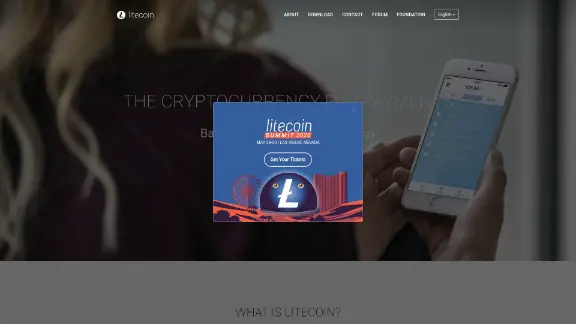Litecoin (LTC)
Litecoin is a peer-to-peer cryptocurrency and open-source software project that was created in 2011 by Charles Lee. It is designed to be a lighter version of Bitcoin with faster confirmation times and operates using a proof-of-work consensus algorithm.
History of Litecoin

| Ticker | LTC |
| Category | Cryptocurrency |
| Website | http://litecoin.org |
| @LTCFoundation | |
| https://www.reddit.com/r/litecoin/ |
Litecoin was released as an open-source client on GitHub on October 7, 2011, by Charlie Lee, a former Google employee. The network went live on October 13, 2011. As a fork of the Bitcoin Core client, it features a decreased block generation time of 2.5 minutes, an increased maximum number of coins (84 million compared to Bitcoin's 21 million), a different hashing algorithm called scrypt, and a slightly modified graphical user interface. In May 2017, Litecoin was the first among the top-5 cryptocurrencies to adopt Segregated Witness. That same month, the first Lightning Network transaction was completed using Litecoin, transferring 0.00000001 LTC from Zürich to San Francisco in under one second.
Overview of Litecoin
Litecoin is a decentralized, peer-to-peer cryptocurrency enabling fast and inexpensive transactions worldwide. It operates as an open-source global payment network independent of any central authority, secured by mathematics, and gives individuals control over their financial transactions.
Litecoin hashing algorithm
Litecoin uses the scrypt hashing algorithm in its mining process. It operates on a proof-of-work consensus mechanism, requiring miners to find a nonce value so that the hash of a candidate block header is equal to or less than the target. The target adjusts automatically to ensure a new block is produced every 2.5 minutes.
Mining
Litecoin was released with 150 pre-mined coins and has a total supply of 84 million coins. The blockchain generates a new block every 2.5 minutes, with a block reward halving approximately every four years. This halving schedule is estimated to reach full dilution around the year 2140.
Open source software
Litecoin is released under the MIT/X11 license, allowing users to run, modify, copy, and distribute the software. The release process is transparent, enabling independent verification of both the binaries and the source code.
Lightning Network
The Lightning Network, proposed by Thaddeus Dryja and Joseph Poon in 2015, aims to enhance scalability. Litecoin was the first cryptocurrency to implement the Lightning Network in 2018. This second-layer solution uses smart contracts to facilitate micropayments, offering lower fees and less demanding workloads than traditional blockchain transactions.
MimbleWimble upgrade
The MimbleWimble upgrade aims to improve user privacy during transactions. First proposed in November 2019 by a developer under the pseudonym Tom Elvis Jedusor, the upgrade allows for more private transactions by simplifying them into a single transfer and recording only one input-output pair. It was implemented on May 19, 2022.
The Litecoin Foundation
The Litecoin Foundation is a community-driven non-profit organization based in Singapore, dedicated to promoting the adoption, education, and development of Litecoin on a global scale.
Litecoin Summit
The Litecoin Summit is an annual event organized by the Litecoin Foundation, bringing together innovators, experts, and community members.
2018
The inaugural Litecoin Summit took place on September 14-15, 2018, at the South San Francisco Conference Center. It provided a platform for companies to showcase products and network with LTC users and developers. Keynote speakers included Charlie Lee, Elizabeth Stark, and Diego Gutierrez Zaldivar.
2019
The second Litecoin Summit was held during Vegas Blockchain Week in October at the Cosmopolitan of Las Vegas. Notable speakers included Charlie Lee, Franklyn Richards, and Xinxi Wang.
2022
The third edition of the Litecoin Summit was held in Las Vegas from October 21-22, 2022. The event focused on industry developments, public policy, and technical innovations, with sponsorship from various organizations.
Litecoin projects
Litecoin Card
The Litecoin Card allows users to utilize Litecoin and other cryptocurrencies. Available in the United States, the UK, and 26 countries in the EEA, it partners with major payment systems like Visa and Mastercard.
Litewallet
Litewallet is a free app for sending and receiving LTC, developed by volunteers from the Litecoin Foundation. The team continues to improve the app, focusing on user experience and ease of use.
Omnilite
Omnilite is an open-source platform for creating tokens and digital assets on the Litecoin blockchain. It offers advantages such as integrity, security, scalability, and low fees, with all transactions recorded on the Litecoin blockchain.
